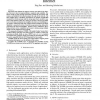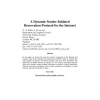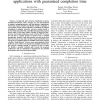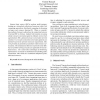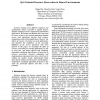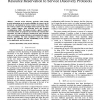113
click to vote
CCR
1999
15 years 1 months ago
1999
Abstract-RSVP has been designed to support resource reservation in the Internet. However, it has two major problems: complexity and scalability. The former results in large message...
133
click to vote
HPN
1998
15 years 3 months ago
1998
In this paper we discuss the need for resource reservation in the Internet and examine some of the strengths and weaknesses of RSVP, which is currently the most popular of Interne...
132
click to vote
ICC
2007
IEEE
15 years 6 months ago
2007
IEEE
In high-end grid networks, distributed resources (scientific instruments, CPUs, storages, etc.) are interconnected to support computing-intensive and data-intensive applications, w...
120
click to vote
RTSS
2005
IEEE
15 years 7 months ago
2005
IEEE
Resource reservation has been recently supported by many real-time operating systems to provide applications with guaranteed and timely access to system resources. Typically, rese...
112
click to vote
CCGRID
2005
IEEE
15 years 7 months ago
2005
IEEE
Internet data centers (IDCs) perform multi-customer hosting on a virtualized collection of resources while Grid computing generalizes distributed computing by focusing on large sc...
100
click to vote
CCGRID
2006
IEEE
15 years 8 months ago
2006
IEEE
Resource sharing across different computers and organizations makes it possible to support diverse, dynamic changing resource requirements of distributed applications. Reservation...
ICC
2007
IEEE
15 years 8 months ago
2007
IEEE
—This paper presents a mathematical framework for resource reservation in TCP/IP networks by invoking a dynamic system viewpoint on the congestion monitoring processes occurring ...
139
click to vote
RTAS
2008
IEEE
15 years 8 months ago
2008
IEEE
The notion of resource reservation for obtaining real-time scheduling guarantees and enforcement of resource usage has gained strong support in recent years. However, much work on...
117
Voted
ICC
2008
IEEE
2008
IEEE
Improving Quality of Experience by Adding Device Resource Reservation to Service Discovery Protocols
15 years 8 months ago
— Current service discovery protocols (SDP) hardly provide information on the actual availability of resources in the network or a mechanism for (device) resource reservation. Wh...
